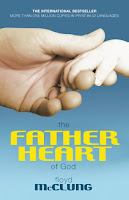 |
| (Amazon UK link) |
I'd heard his book recommended in various Christian circles, so was pleased when I came across it, reduced in price, at a local bookshop.
'The Father heart of God' has many shocking anecdotes about people whom the author spoke to in the course of his work. It tells, for instance, of a young man who claimed that the happiest day of his life was when he heard that his parents had both been killed in an accident. Or the girl who wished she were dead because her mother kept comparing her negatively to her dead sister.
With a straightforward style, the book takes us to what Floyd McClung calls 'the wounded heart of man': the childhood abuse and neglect that causes so many people to embark on lives of drugs or prostitution, full of bitterness and anger.
But it isn't a negative book. Far from it. The author does not wallow in the pain of these young people, he simply shows us snapshot moments in their lives. And then he takes us to a different perspective: that of God, who is portrayed in the Bible as a loving Father.
So this book can be read at two levels: that of parents wanting to ensure that they give their children the fathering and mothering that will enable them to be confident, secure adults, and that of people who want to know more about the real Biblical view of God rather than the many false images that are portrayed in the media, by politicians, and even by some churches.
As both a parent and a Christian, I found it a highly readable and moving book. The style is simple but never condescending, mixing the author's experiences with basic theology and explanations of Scripture verses. Any chapter could be read alone; those who aren't interested in God could still find much to challenge them in the sections about parenthood and the ideal which Floyd McClung sees as God's pattern for parenthood, but which secular psychologists would probably approve too.
But for those who are Christians, or interested in Christianity, the whole book is well worth reading from cover to cover. Gently and unobtrusively it invites people to consider their past, to forgive their parents for their faults, and to begin to see God as who he is rather than the distorted image that so many of us carry around from our early years.
The book also covers emotional and spiritual healing, breaking out of judgemental cycles, and dealing with the inevitable disappointments of life. It ends with an appendix discussing authority, and giving general constructive criteria for finding a counsellor or therapist for those that need professional help in overcoming childhood wounds. Despite being a fairly contented person without any history of abuse or neglect, I found a lot in this book that was helpful and also challenging to me: both as a parent, and simply as a person who sometimes observes others in emotional turmoil but has little idea what to say.
Despite all this wealth of experience and discussion, it's not a long book. Including the introduction and epilogue it's only 160 pages, and I read it in a couple of hours.
Highly recommended.
No comments:
Post a Comment